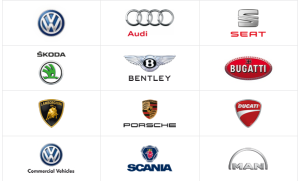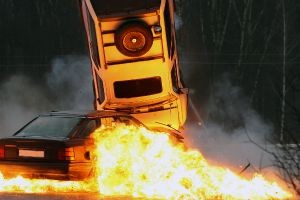The Volkswagen crash: picking up the pieces
(Disclaimer: As a strategy consultant, I have advised Volkswagen on a few occasions. However, this work has been completely unrelated to the current crisis they face, and I do not draw upon any information from my projects in this blog post, relying instead on public sources of information to share my personal perspectives on the unfolding crisis and its broader implications.)
The Singapore Grand Prix, eventful as it was, has been completely eclipsed by the great crash at Volkswagen this week. Instead of a single car though, it is the auto giant itself that has crashed, losing over 30% of its stock value, which roughly translates to US$ 25 billion in lost market capitalization in a single week, and claiming the CEO as the first head to roll. Unfortunately for them, their suppliers, the auto industry and the associated ecosystem players, there is much more debris that is yet to crash-land before we can start counting the damage done and picking up the pieces.
A shocking debacle
 What has shocked industry participants is the way in which Volkswagen has gone from being the rising star of the auto industry for the last few years to being its black sheep in a matter of days. Volkswagen has been growing tremendously in sales, market share and brand image over the last few years. In fact, for the first half of 2015, VW for the first time overtook Toyota to claim the world #1 position in auto sales by selling just over 5 million vehicles. It now emerges that over 11 million of the vehicles they sold over the last 7 years since 2008 could have been fitted with the so called defeat devices that have ultimately defeated Volkswagen, more than anyone else. As a group, Volkswagen sells twelve prestigious brands, of which VW and Audi appear to be impacted, or at least that’s what we know so far. Also, only diesel versions are affected (as these were the high emission ones where the defeat devices were used to rig rest results in order to trick regulators into thinking emissions from the vehicles were much lower than they actually were) and the company claims the issue is limited to only one type of diesel engine it sold over the years.
What has shocked industry participants is the way in which Volkswagen has gone from being the rising star of the auto industry for the last few years to being its black sheep in a matter of days. Volkswagen has been growing tremendously in sales, market share and brand image over the last few years. In fact, for the first half of 2015, VW for the first time overtook Toyota to claim the world #1 position in auto sales by selling just over 5 million vehicles. It now emerges that over 11 million of the vehicles they sold over the last 7 years since 2008 could have been fitted with the so called defeat devices that have ultimately defeated Volkswagen, more than anyone else. As a group, Volkswagen sells twelve prestigious brands, of which VW and Audi appear to be impacted, or at least that’s what we know so far. Also, only diesel versions are affected (as these were the high emission ones where the defeat devices were used to rig rest results in order to trick regulators into thinking emissions from the vehicles were much lower than they actually were) and the company claims the issue is limited to only one type of diesel engine it sold over the years.
Many unanswered questions
As with any crisis unfolding on this scale, the market is currently abuzz with several unanswered questions and with rumors and speculative answers to each of them. Some of the most worrisome questions are:
- Are more VW models and VW Group brands in the USA (beyond the ones currently identified by the US EPA) fitted with defeat devices that we don’t know about?
- The 11 million vehicles that are now known to be fitted with these devices have been sold world-wide over years. This revelation will trigger a strong regulatory testing spree globally, especially in Europe. Will more skeletons fall out of the closet as this happens, affecting more brands, models and engine types than we know of today?
- Is the cheating / rigging limited only to emissions testing or could the enhanced scrutiny surface issues on other aspects, e.g. safety?
- Considering the degree to which automotive supply chains are integrated, could car-makers beyond VW be affected, especially if they used the same suppliers for their diesel versions?
If the answers to any of these questions is yes, the crisis could turn out to be much bigger than our current understanding of it. Beyond these questions, there are other diagnostic questions that will need to be asked and answered:
- How could such a blatant case of cheating have been carried on, and that too on such a large scale, in the operations of one of the most respected companies in the world?
- What were the motivations (or the pressures) that individuals faced that led them to make these kinds of compromises in integrity? Who was aware of it and why did they condone it?
- The damning tests that exposed VW were done and published well over a year ago! Why was no corrective action taken till date?
- It turns out that defeat devices are neither new nor unknown – in fact, there is a long history of violations involving the use of such devices, which amazingly enough has included VW in the past too! Why have regulators been unable to defeat defeat devices? When the opposition Green Party raised this issue in the German parliament a few months ago, the official response was that there is no foolproof way to detect such devices. Is that believable, or is this a case of governments looking the other way, as the Green Party is alleging?
However, those of us who have lived through the Enron crisis (and several others like it) know very well how this dynamic works. The story of the hyper ambitious CEO on stock incentive steroids driving strong results that fuel a quarter-on-quarter stock growth story that spins out of control and leads to compromises in quality and integrity that lead to a resounding crash has played itself out with too sickening a regularity for it be an unfamiliar tale; in fact, one is filled with a sense of deja vu.
There is a need to go beyond mouthing the usual banalities on regulatory vigil and corporate governance to instead address the root cause: the perverse incentive mechanisms in today’s corporate and stock markets that lead to such crises from time to time.
Broader implications
It would be belaboring the obvious to say that the Volkswagen Group will take a long time to recover from this crisis, especially to recover the damage to their brand image and credibility, which had only just propelled them to numero uno status in the auto world. While that is a painful consequence in and of itself, the potential ramifications of this crisis go well beyond the beleaguered Volkswagen group.
Already, questions are being raised about how much this will affect the German auto industry and it increasingly appears that even brand Germany will need some nifty damage control to avoid being engulfed in the ensuing credibility crisis. If Germany sneezes, Europe could catch a cold it can ill afford, considering its current health. On a global scale and looking beyond the auto industry, this crisis puts back the question mark on diesel as a fuel for automotive use due to environmental concerns. Will this spell the decline of diesel and the revival of interest and investment in CleanTech, which will swing the energy industry pendulum even more in the favor of the USA? Time will tell.
On the other hand, the credibility crisis unleashed by this event will not – and should not – leave regulators unscathed. It is more than slightly alarming to see how helpless regulators seem to be against defeat devices, which are pieces of embedded software in cars. In a world excited by the promise of increasingly – or indeed, entirely – autonomous vehicles (the so-called driver-less cars), the specter of cybercrime compromising individual cars or even fleets suddenly becomes more real and more scary and it is disconcerting to see our lack of readiness to deal with relatively simpler hacking software. Regulators will need to step up their game not only to protect the environment, but also to make the drive towards vehicle automation safe for us all.
Auto companies like Volkswagen regularly conduct crash tests to make their vehicles safer for consumers. In these tests, engineers deliberately crash cars under controlled conditions and then examine the collision dynamics and the debris to learn about – and improve – car safety. Picking up the pieces and learning the lessons from the crash of Volkswagen itself will be a much more complex exercise, but hopefully a much more instructional one, too.




Dear Dr. Joshi… I am planning a case on Volkswagen fiasco..I already started writing on this issue.
Thanks for sharing this insightful piece…If you give permission may I use the excerpts of it for my purpose. Rgds…Dr. Pradeep Kautish
Dear Dr. Kautish,
For avoidance of doubt, I am assuming you mean a case study (and not a court case)! If so, please feel free to use excerpts from this blog post for your case study. Thanks for reading and appreciating it!